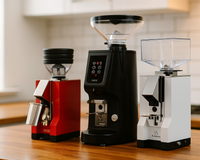The Truth About Caffeine in Coffee Ice Cream: Everything You Need to Know
The Verdict: Yes, coffee ice cream does contain caffeine. The amount of caffeine in coffee ice cream can vary depending on the recipe, but it typically contains less caffeine than a cup of coffee. However, the exact amount of caffeine in coffee ice cream can be difficult to determine since it depends on factors like the amount of coffee used in the recipe and the type of coffee beans used. Some brands may also have higher or lower amounts of caffeine in their coffee ice cream, so it's always a good idea to check the label or ask the manufacturer for more information.

Coffee ice cream is a popular flavor that combines the sweetness of ice cream with the rich and bold flavor of coffee. For many coffee lovers, it's the perfect way to satisfy their sweet tooth and get their caffeine fix at the same time. However, have you ever wondered whether coffee ice cream actually contains caffeine?
In this blog post, we'll explore the question on everyone's mind: does coffee ice cream have caffeine? We'll provide you with all the information you need to know about the caffeine content of coffee ice cream, including how much caffeine is typically found in a scoop, and the potential health effects of consuming caffeine. Whether you're a coffee ice cream fanatic or simply curious about this popular flavor, read on to learn more about the buzz behind coffee ice cream.
History of Coffee Ice Cream
The exact origin of coffee ice cream is unclear, but it is believed to have been popularized in the United States in the early 20th century. Some historians trace the origins of coffee ice cream back to Italy, where gelato flavored with espresso has been enjoyed for centuries.
During the early 20th century, coffee was becoming an increasingly popular beverage in the United States, and many people began to experiment with using coffee as a flavoring in other foods, including ice cream. One early recipe for coffee ice cream was published in a cookbook called "The Hostess of To-Day" in 1913, which called for steeping coffee beans in cream before making the ice cream base.
Coffee ice cream gained popularity during the 1920s and 1930s, as ice cream parlors and soda fountains became popular gathering places for socializing and enjoying sweet treats. Today, coffee ice cream remains a popular flavor in many parts of the world, with variations ranging from classic coffee to more exotic blends like mocha and cappuccino.
Related Article: Here's how much caffeine is in McDonald's Iced Coffee
What exactly is caffeine?
Caffeine is a natural stimulant found in many plants, including coffee beans, tea leaves, and cocoa beans. It acts as a central nervous system stimulant, which means that it can increase alertness, energy, and focus. Caffeine is commonly consumed in beverages like coffee, tea, and soda, but it can also be found in foods like chocolate and, as we now know, coffee ice cream.

Can caffeine be found in coffee ice cream?
It's important to know whether caffeine is present in coffee ice cream for a few reasons. First, some people may be sensitive to caffeine and want to limit their intake. For these individuals, knowing the caffeine content of coffee ice cream can help them make informed decisions about what they eat and drink.
Additionally, for some people, caffeine consumption can lead to side effects like insomnia, nervousness, and an increased heart rate. By knowing the caffeine content of coffee ice cream, people can make decisions that help them avoid these side effects.
Finally, some people may be looking to consume caffeine as a way to boost their energy levels or focus, and knowing the caffeine content of coffee ice cream can help them determine whether it's an effective way to do so.
Does coffee ice cream have caffeine?
Yes, coffee ice cream does contain caffeine. As the name suggests, coffee ice cream is made with coffee, which naturally contains caffeine. However, the amount of caffeine in coffee ice cream can vary depending on the recipe and the amount of coffee used.
On average, a scoop of coffee ice cream contains around 30-45 milligrams of caffeine. This is less than the amount of caffeine found in a typical cup of coffee, which can contain anywhere from 70-140 milligrams of caffeine depending on the size and strength of the brew.
Related Article: Coffee vs. Soda - Which packs more caffeine?
How much caffeine is in coffee ice cream?

On average, a scoop of coffee ice cream contains around 30-45 milligrams of caffeine. However, the amount of caffeine in coffee ice cream can vary depending on the recipe and the brand.
Some brands of coffee ice cream may use more or less coffee, or a different type of coffee, which can affect the caffeine content. Additionally, some brands may add extra caffeine to their ice cream as a way to enhance the flavor or give it an extra boost. It's important to check the label or ask the manufacturer for more information if you're concerned about your caffeine intake.
It's also worth noting that the size of the scoop can affect the amount of caffeine you consume. A larger scoop will contain more caffeine than a smaller one, so it's important to be mindful of portion sizes when consuming coffee ice cream or any other caffeinated food or beverage.
Overall, while coffee ice cream does contain caffeine, the amount is typically lower than what you would find in a cup of coffee. However, if you're sensitive to caffeine or trying to limit your intake, it's important to be mindful of how much coffee ice cream you consume and to check the label or ask the manufacturer for more information about the caffeine content.
Health effects of caffeine
So is caffeine good for you? Or bad? Like most things these days, there are both good and negative health benefits to caffeine.
Positive effects:
- Increased alertness and focus
- Improved mood and feelings of well-being
- Enhanced athletic performance and endurance
- Reduced risk of certain diseases, such as Parkinson's disease, Alzheimer's disease, and liver disease
- Potential to improve cognitive function and memory
Negative effects:
- Difficulty sleeping or insomnia
- Jitters, nervousness, and anxiety
- Increased heart rate and blood pressure
- Digestive issues like nausea and stomach upset
- Headaches and migraines
- Withdrawal symptoms like fatigue and irritability when caffeine intake is reduced or stopped abruptly
It's worth noting that the effects of caffeine can vary depending on the individual and their sensitivity to caffeine. Some people may be able to consume higher amounts of caffeine without experiencing negative side effects, while others may be more sensitive and experience negative effects even with small amounts of caffeine. It's important to be mindful of your own caffeine intake and to pay attention to how it affects you personally.















